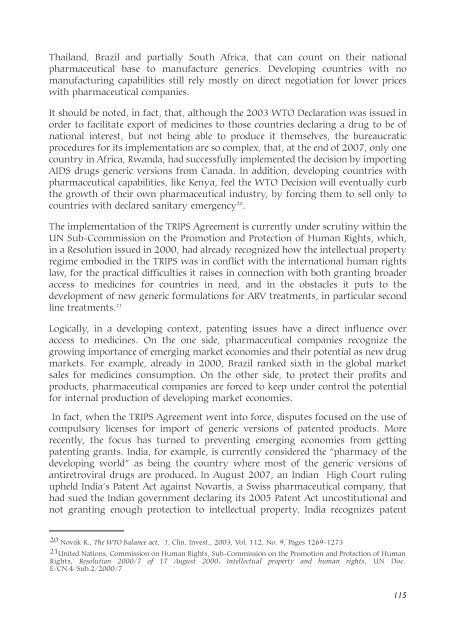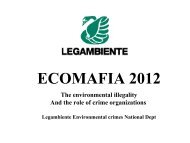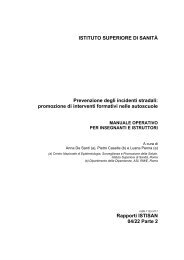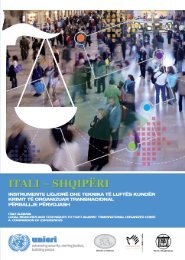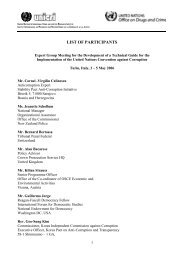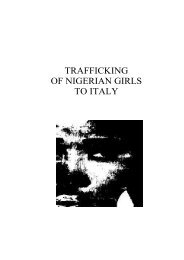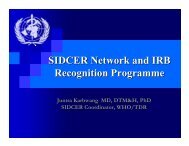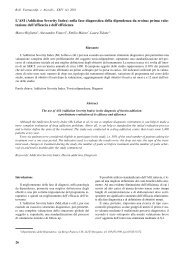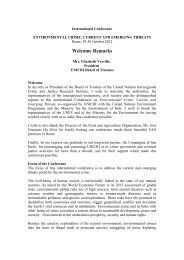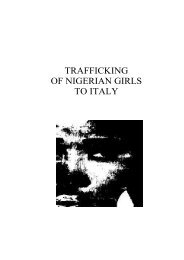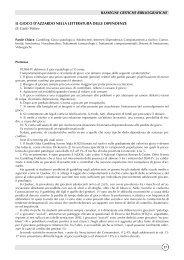Biomedical Research in Developing Countries - UNICRI
Biomedical Research in Developing Countries - UNICRI
Biomedical Research in Developing Countries - UNICRI
Create successful ePaper yourself
Turn your PDF publications into a flip-book with our unique Google optimized e-Paper software.
Thailand, Brazil and partially South Africa, that can count on their national<br />
pharmaceutical base to manufacture generics. Develop<strong>in</strong>g countries with no<br />
manufactur<strong>in</strong>g capabilities still rely mostly on direct negotiation for lower prices<br />
with pharmaceutical companies.<br />
It should be noted, <strong>in</strong> fact, that, although the 2003 WTO Declaration was issued <strong>in</strong><br />
order to facilitate export of medic<strong>in</strong>es to those countries declar<strong>in</strong>g a drug to be of<br />
national <strong>in</strong>terest, but not be<strong>in</strong>g able to produce it themselves, the bureaucratic<br />
procedures for its implementation are so complex, that, at the end of 2007, only one<br />
country <strong>in</strong> Africa, Rwanda, had successfully implemented the decision by import<strong>in</strong>g<br />
AIDS drugs generic versions from Canada. In addition, develop<strong>in</strong>g countries with<br />
pharmaceutical capabilities, like Kenya, feel the WTO Decision will eventually curb<br />
the growth of their own pharmaceutical <strong>in</strong>dustry, by forc<strong>in</strong>g them to sell only to<br />
countries with declared sanitary emergency 20 .<br />
The implementation of the TRIPS Agreement is currently under scrut<strong>in</strong>y with<strong>in</strong> the<br />
UN Sub-Ccommission on the Promotion and Protection of Human Rights, which,<br />
<strong>in</strong> a Resolution issued <strong>in</strong> 2000, had already recognized how the <strong>in</strong>tellectual property<br />
regime embodied <strong>in</strong> the TRIPS was <strong>in</strong> conflict with the <strong>in</strong>ternational human rights<br />
law, for the practical difficulties it raises <strong>in</strong> connection with both grant<strong>in</strong>g broader<br />
access to medic<strong>in</strong>es for countries <strong>in</strong> need, and <strong>in</strong> the obstacles it puts to the<br />
development of new generic formulations for ARV treatments, <strong>in</strong> particular second<br />
l<strong>in</strong>e treatments. 21<br />
Logically, <strong>in</strong> a develop<strong>in</strong>g context, patent<strong>in</strong>g issues have a direct <strong>in</strong>fluence over<br />
access to medic<strong>in</strong>es. On the one side, pharmaceutical companies recognize the<br />
grow<strong>in</strong>g importance of emerg<strong>in</strong>g market economies and their potential as new drug<br />
markets. For example, already <strong>in</strong> 2000, Brazil ranked sixth <strong>in</strong> the global market<br />
sales for medic<strong>in</strong>es consumption. On the other side, to protect their profits and<br />
products, pharmaceutical companies are forced to keep under control the potential<br />
for <strong>in</strong>ternal production of develop<strong>in</strong>g market economies.<br />
In fact, when the TRIPS Agreement went <strong>in</strong>to force, disputes focused on the use of<br />
compulsory licenses for import of generic versions of patented products. More<br />
recently, the focus has turned to prevent<strong>in</strong>g emerg<strong>in</strong>g economies from gett<strong>in</strong>g<br />
patent<strong>in</strong>g grants. India, for example, is currently considered the “pharmacy of the<br />
develop<strong>in</strong>g world” as be<strong>in</strong>g the country where most of the generic versions of<br />
antiretroviral drugs are produced. In August 2007, an Indian High Court rul<strong>in</strong>g<br />
upheld India’s Patent Act aga<strong>in</strong>st Novartis, a Swiss pharmaceutical company, that<br />
had sued the Indian government declar<strong>in</strong>g its 2005 Patent Act uncostitutional and<br />
not grant<strong>in</strong>g enough protection to <strong>in</strong>tellectual property. India recognizes patent<br />
20 Novak K., The WTO balance act, J. Cl<strong>in</strong>. Invest., 2003, Vol. 112, No. 9, Pages 1269-1273<br />
21 United Nations, Commission on Human Rights, Sub-Commission on the Promotion and Protection of Human<br />
Rights, Resolution 2000/7 of 17 August 2000, Intellectual property and human rights, UN Doc.<br />
E/CN.4/Sub.2/2000/7<br />
115


